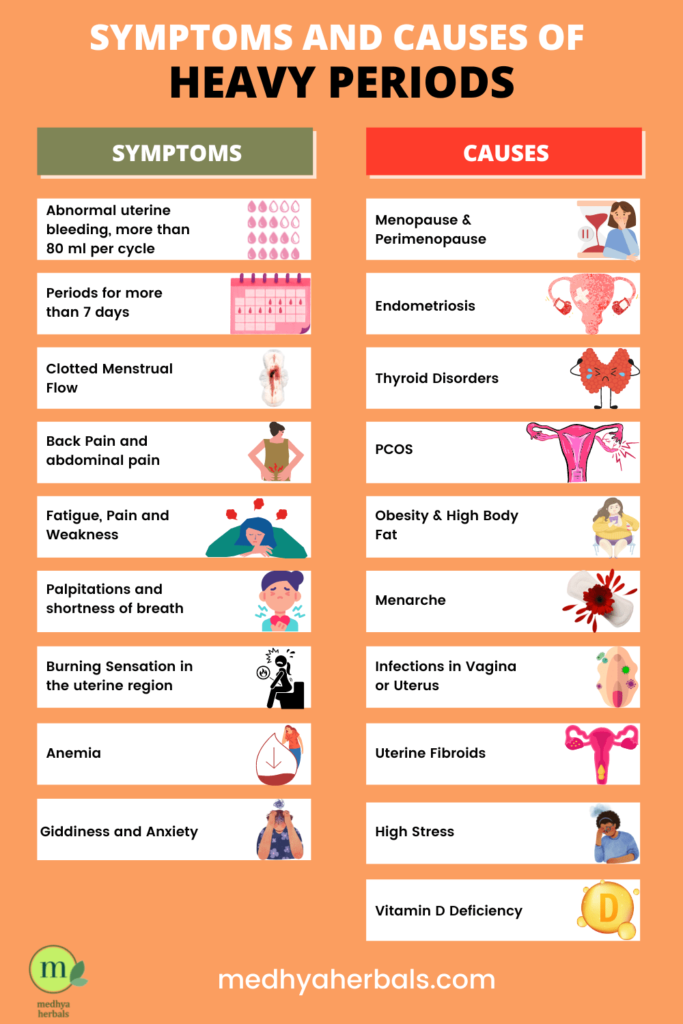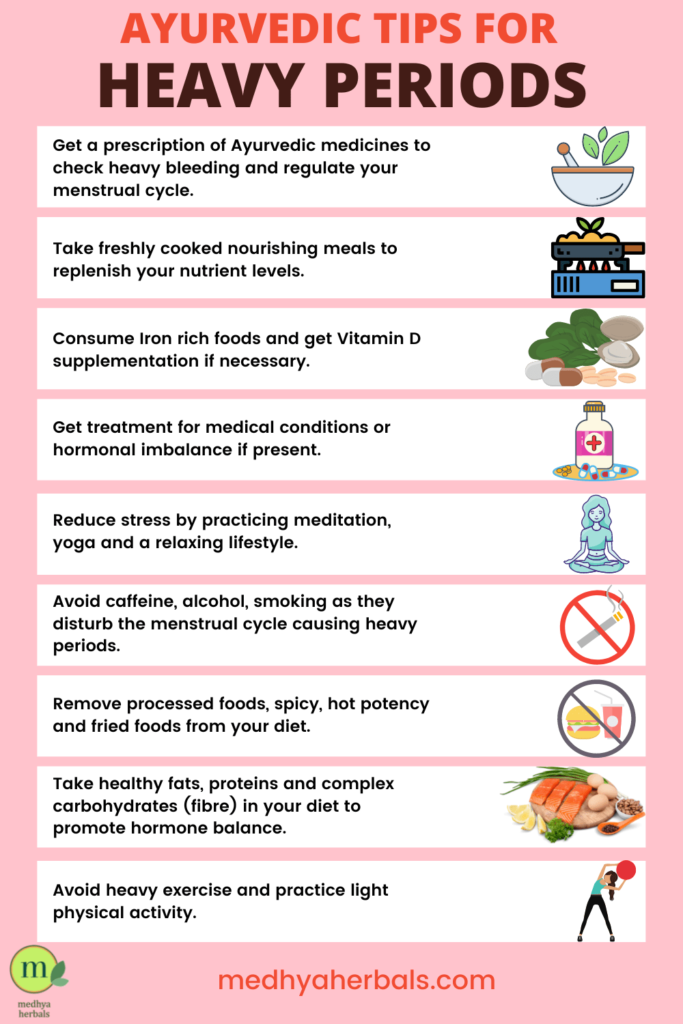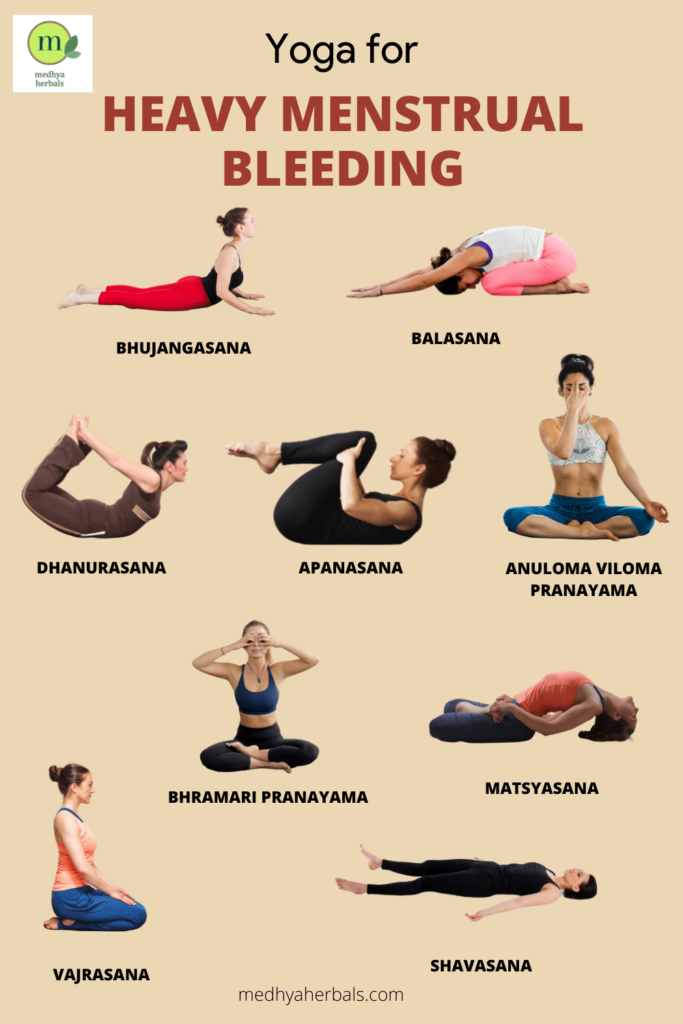If you are currently struggling with heavy menstrual bleeding (menorrhagia) then you need to immediately attend to your menstrual cycle health. Excess blood loss due to heavy menstrual bleeding can lead to iron deficiency anemia, which can further complicate your health situation.
In this post, we will help you dig deeper into the symptoms and causes of excessive menstrual bleeding with blood clots. We will go through highly effective Ayurvedic medicines to reduce menstrual bleeding and Ayurvedic natural ways to treat heavy periods. Let’s begin!

What is Heavy Menstrual Bleeding?
Heavy Periods refers to monthly menstrual bleeding which is excessive in the quantity of bleeding during the periods. It may also happen in the form of prolonged menstrual bleeding.
Clinically menorrhagia is diagnosed when a woman experiences menstrual blood loss in excess of 80 ml per cycle.
Very heavy menstrual bleeding is not a disease in itself. It is a common menstrual health symptom that is observed in multiple gynecological conditions such as Endometriosis, Uterine Fibroid, Hormonal Imbalance, Bleeding disorders, Thyroid dysfunction, and many more.
Symptoms of Menorrhagia
Some of the symptom and signs of menorrhagia include burning sensation in lower portion of groin, pelvic region, and back region of kidney.
Severe pain in uterus may also accompany heavy vaginal bleeding. Additional symptoms include:
- Abnormal uterine bleeding, more than 80 ml per cycle. This may require you to change more than 4 pads during the day and also in the night. You may also need to use double protection to avoid the leakage.
- Excessive bleeding with clots
- Prolonged menstrual flow, more than 7 days
- Pain in the lower back portion and lower abdomen
- Fatigue, Pain and Weakness due to excess blood loss and low Iron
- PMS Symptoms, Menstrual cramp or period pain in the central part of the abdominal region
- Giddiness and Inability to do usual work
- Anemia
- Palpitations and shortness of breath, primarily due to excessive loss of blood
- Burning Sensation in the uterine region
Range of Women Who Suffer From Heavy Menstrual Bleeding
Did you know that more than 75,000 hysterectomies (removal of uterus) are carried out every year? Out of these surgeries, nearly 30% happen due to disturbances in menstrual cycles.
And that bleeding disorders during menstruation is one of the most serious complaints that leads to Hysterectomy?
- The World Health Organization reports that 18 million women aged 30-55 years perceive their menstruation to cause very heavy bleeding.
- Medical data indicates nearly 30% women of reproductive age to have reported heavy bleeding at some point.
- Out of these, 10% of the women experience severe blood loss that leads to iron deficiency anemia and is clinically defined as Menorrhagia.

What causes Heavy Period with Blood Clots?
Heavy menstrual bleeding may happen due to nutritional deficiencies or hormonal imbalance that eventually trigger menstrual disorder and painful periods:
1. Hormone Imbalances
- High Estrogen levels and Estrogen Dominance
- Thyroid dysfunction
- Low Progesterone levels
- No Ovulation
- Endometriosis
- PCOS
- Menopause and Perimenopause
- Early years of Menarche
Hormone imbalances as high Estrogen, PCOS and thyroid problems often cause anovulation. This further aggravates hormone imbalance causing low Progesterone and Estrogen dominance.
Thus, the uterine lining keeps building up (endometrial hyperplasia) under the action of high Estrogen. However, the quality of endometrium is not good as there is no progesterone, which should have been released after the ovulation.
Thus, the endometrium mostly has fibrous tissues and muscles, which come out as heavy periods with passage of large blood clots. This type of period cycle is also termed as dysfunctional uterine bleeding.
2. Obesity and High Body Fat
High body fat both create a situation in which your endometrium is not able to build up in good quality. Usually, it contains high mucus, muscles, and fibrous growth.
Thus, your periods appear heavy, clotted, and with excess vaginal discharge.
3. Health Conditions and Medications
- Certain blood thinning medications
- Birth control pills as Progesterone-only pills
- Intrauterine Device
- Pelvic adhesions or congestion
- Ovarian tumors
- Genital T.B.
- Infections in Vagina or Uterus
- Uterine Fibriods and or Polyps in Uterus or Ovaries
- Adenomyosis
- Miscarriage
4. Excessive stress
Stress hampers fertility and ovulation. And when you are stressed chronically, you undergo same symptoms as hormone imbalances that have been fuelled by high Cortisol levels.
You may or may not have periods. Usually, these are anovulatory cycles (no ovulation), hence accompany heavy periods with clots.
5. Nutritional Deficiency
Nutritional deficiency as low Iron levels and or Vitamin D deficiency often trigger hormone imbalances and stop ovulation.
Thus, you may end up struggling with the same problem of anovulatory cycles, which create heavy unabated bleeding due to low or no progesterone.
Low Iron and Vitamin D directly affect the thyroid gland, which is often the reason behind periods that won’t stop no matter what!
In this case, you need to take thyroid hormones to quickly attend to your health condition and eventually adopt natural measures for long term relief.
An Ayurvedic View of Heavy Periods with Clots
In Ayurveda, abnormal uterine bleeding with large blood clots is classified as Asrigdara, which means heavy vaginal bleeding during, before, or after the menstrual cycle.
Heavy menstrual bleeding is also referred as Raktapradara in Ayurveda.
The ancient physicians of Ayurveda classified heavy periods into different types based on the symptoms, dosha and dhatu “body tissues” that are involved.
1. Vataja Raktapradara
This is primarily triggered by Apana Vata Imbalance in the reproductive system. In this condition menstrual blood is frothy and reddish, or blackish in color. The menstrual blood flows quickly, does not clot, and it is cold in temperature. Accompanying symptom are severe period cramps and irregular period.
2. Kaphaja Raktapradara
This is caused by Kapha Imbalance in the reproductive system. In this condition, menstrual blood resembles has a red rusty colour.
The blood flows very slowly. In this case, menstrual blood is clotted in nature. These clots resemble muscular masses as fiber that are joined together.
3. Pittaja Raktapradara
This is caused by Pitta Imbalance in the reproductive system. In this condition, menstrual blood becomes blue, yellow, green, blackish in colour. It resembles water mixed with smoke.
It flows fast and does not coagulate. Menstrual blood may also contain white flecks and at times may be thin and stringy.
4. Sannipataja Raktapradara
This is caused by combination of all three doshas. In this case, menstrual blood has features of all three doshas together.
Such in-depth classification of the condition based on the underlying causes and their specific symptoms allows an Ayurvedic Doctor to advise on patient-specific treatment for the heavy menstrual bleeding.
When you opt to treat heavy periods at the root cause level, you will be sure to find relief in the long term. Now, let’s look into the details of Ayurveda treatment options for heavy periods.
Ayurvedic Treatment for Heavy Periods
Ayurvedic treatment of heavy periods focuses on the diet and lifestyle modifications to balance off the aggravated Dosha. In addition, medicines and herbs that stop excessive bleeding and nourish the Rakta Dhatu (blood tissues) are prescribed.
Since, Anemia generally accompanies menorrhagia, strength promoting rasayanas are also recommended to the patients.
1. Ayurvedic Herbs for Heavy Periods

Ayurvedic herbal medicines are highly effective in treating heavy periods. They naturally balance hormones, detoxify to reduce inflammation and thus reduce heavy menstrual bleeding and muscle cramps.
These Ayurvedic herbs can be consumed upon consultation with Ayurvedic doctor, who can advise you on specific dosage and directions.
Regular consumption of Ayurvedic medicines can prevent the need for surgical procedures and invasive treatment options such as steroids based anti-inflammatory drugs, endometrial ablation treatment and hormonal birth control pills.
1. Amla
Amla helps to reduce menstrual bleeding by working on hormonal balance. It has detoxifying qualities and acts as an anti-inflammatory agent. Thus, amla also reduces cholesterol levels.
2. Licorice
Licorice is a sweet tasting root that helps to balance hormones. Specifically, it helps to reduce high Estrogen and high Androgen level. This thus helps to remove the root cause of multiple health conditions at once.
Licorice is effective against inflammatory disorders and helps to establish the integrity of the digestive tract. This reduces bloating and constipation symptoms as well.
3. Ashoka
Ashoka bark acts as a tonic for uterus. It promotes ovulation, establishes hormone balance and significantly reduces high Estrogen levels.
Thus, it is highly effective herbal remedy to reduce heavy menstrual bleeding due to anovulation and Estrogen dominance.
4. Aloe Vera
Aloe vera has a toning effect on reproductive system, specifically the uterus. It is an emmanagogue, meaning it helps to establish regular menstrual flow. Also, aloe vera supports detoxification. It significantly reduces pms, menstrual irregularities and menstrual pain.
Regular consumption of aloe vera will help you to reduce the pain, support ovulation, establish regular periods and prevent bleeding disorders.
5. Lodhra
Lodhra is highly effective in a heavy period and to prevent formation of thick uterine lining. It helps to regulate ovarian hormones, establishes regular ovulation and improves fertility.
Regular consumption of lodhra can work even better than endometrial ablation treatments.
6. Triphala
Triphala is a powerful Ayurvedic Rasayana (Herbal elixir known to promote longevity and rejuvenation).
It deeply cleanses our body and helps to flush out wastes and toxins. Triphala has powerful antioxidants to rejuvenate, inhibit inflammation, promote healthy build of body cells, and blood purification.
7. Shatavari
Shatavari nourishes the reproductive tissues and improves the fertility health in a woman. It enhances follicle production and ovulation and prepares uterus for conception.
Shatavari cools the Pitta dosha, rightly nourishes the body and prevents blood loss due to heavy period and passage of large blood clots.
8. Dandelion Flower and Greens
The bitter tasting herbal remedy dandelion is extremely useful to pacify both Kapha and Pitta Dosha. This helps to restrict heavy periods with clots and prevents them from occurring in the long term.
9. Ginger
It is one of the best common herb that acts as a natural pain killer, detoxifies and supports digestive system. Ginger reduces intensity of menstrual cramps and helps with multiple period problems. Take it as ginger tea.
2. Ayurvedic Diet for Healthy Period
In Ayurveda Menorrhagia is considered to be a result of faulty lifestyle and foods. Excessive consumption of salty, sour, hot, spicy, and heavy to digest foods vitiates the Doshas resulting in heavy bleeding during menstrual cycle.
A diet involving Sweet, Bitter and Astringent tastes is highly beneficial to reduce bleeding in periods. These tastes help to pacify Pitta and Vata Dosha and also supply the required nutrients to remove the deficiencies.
Thus your diet can improve your chances of having healthy menstrual cycle, regular ovulation and balanced nutrition.
Best Foods to Prevent Menstrual Problem & Heavy Menstrual Bleeding
- Include sufficient proteins from plant based foods to support hormone balance. These are pitta pacifying foods that will also reduce bleeding within 7-10 days.
- Take in lots of iron rich foods to support your iron levels and reduce bleeding. You can find here how low Iron levels trigger heavy periods in the first place.
- Prefer cooling and normal temperature beverages such as coconut water, still water, and herbal teas.
- Include a variety of fresh vegetables in your diet.
- Eliminate foods with a hot potency and hot temperature such as chili and cayenne pepper.
- Lower your intake of foods that have a high glycemic index.
- Avoid excess salt, chilies, spices, sour foods, and pickles.
- Reduce the use of caffeine, stimulants, refined sugar, and cold drinks.
- Stop the consumption of processed foods and packaged foods.
4. Ayurvedic Lifestyle Tips for Heavy Periods with Clots

Ayurvedic lifestyle tips provide guidance daily routine that helps to establish hormone balance and prevent heavy menstrual bleeding. Here’s what you should do:
- Manage and reduce stress levels by either avoiding stressful activities or by better planning. Stress is one sure way to get your hormones out of whack.
- Practice regular meditation to help you relax and reduce your stress levels.
- Reduce your exposure to endocrine disrupting materials such as BPA and Dioxins. They trigger Estrogen dominance and make you more prone to heavy periods with clots.
- Restrict your use of hormone-based contraceptives. If you can, then you should avoid them completely.
- Avoid Smoking, Alcohol and any other stimulants. All of these disturb the hormone balance and create additional toxin build up in the body.
- Keep a regular, again, regular, sleep pattern in the night. Learn here on Ayurvedic guidelines for good sleep.
5. Physical Activity and Exercise
- Engage in regular, relaxing, calming, and cooling physical activity.
- Exercise at least 3 – 5 days a week through stabilizing workout routines such as involving in recreational and non-competitive sports, traditional dances, swimming, hiking, running or brisk walking in nature or near water, yoga, Tai Chi, or Cycling.
- Avoid over exertion and excessive stretch. As a golden rule, exercise up to 50% of your body’s capacity.
- Regularly practice breathing exercises (pranayama) to improve oxygen circulation, relax your mind and naturally detoxify your body through the lungs pathways. Here are the helpful breathing exercises:
6. Yoga for Heavy Menstrual Bleeding
Yoga is one of the best forms of exercise that improves muscular strength and mental balance. Regular practice of yoga can help to strengthen and tone up pelvic floor muscles and that of the uterus.
This helps to promote circulation and hence reduce the possibility of heavy flow in periods.
Yoga therapy is also applied in Ayurvedic medicine to address health concerns. Here are some yoga poses that are helpful to prevent heavy bleeding.

- Cat cow pose: It squeezes the region of the abdominal area where the liver is found. Thus, it stimulates liver function, promotes natural detoxification and improves hormone balance.
- Frog pose: This benefits the digestive system and pelvic floor as a whole. It also improves blood circulation around the abdominal area.
- Half Lord of the Fish Pose (Ardha Matsyendrasana): It squeezes the abdomen in a way that relaxes the abdominal muscles and the liver. Also, it helps to reduce inflammation in the lower body.
- Downward Facing Dog (Adho Mukha Svanasana): This has wide-reaching effects on all body systems. It promotes the storage of nutrients in the cells of the body and relaxes the nervous system.
- Plow Pose (Halasana): This pose reduces fatigue, improves circulation, enhances metabolism and detoxification.
Takeaway!
Heavy Periods is a progressive and painful health symptom of hormone imbalance. But, you can prevent it by pursuing a Healthy Diet and Lifestyle. Act Early to Prevent Health Issues Later!
Ayurveda offers effective natural ways for treatment of menorrhagia, thus reducing the symptoms and preventing the recurrence of the condition. Ayurvedic diet, lifestyle and medication provides a holistic natural avenue for permanent relief from health symptoms at the root cause level.
Consult with Medhya’s Ayurvedic Health Experts to get your personalised health plan involving prescription for Ayurvedic medicine, diet, yoga and lifestyle guidelines.
FAQ
What are the health risks of Heavy Periods?
Chronic and extreme cases of heavy periods put the health of women at risk. Heavy menstrual bleeding affects the health of women at all levels including physical, mental, emotional and social.
- Heavy menstrual flow leads to blood loss. It may lead cause Anemia and trailing symptoms of low Iron levels.
- Giddiness, extreme fatigue, severe backache, weakness and excessive water retention may result from severe loss of blood.
- Congestive heart failure, fainting or loss of consciousness in multiple cases.
- Menorrhagia also increases risk of reproductive system infections as bacterial vaginosis.
References
ASRIGDHARA CHIKITSA W.S.R TO MENORRHAGIA – A CASE STUDY
AYURVEDIC APPROACH OF MENORRHAGIA: ASRIGDARA

